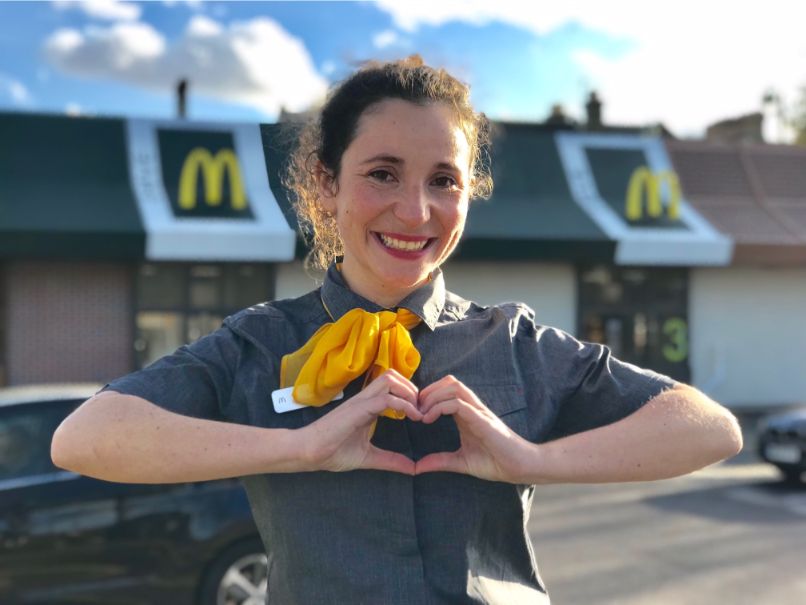
A catalyst for change
Jamie Shields has worked at talent solutions firm AMS for five years. He says he...read more
In Mental Health Awareness Week our award winners McDonald’s told us how they’ve supported staff mental health over the last year

This year’s Mental Health Awareness Week feels more pertinent than ever given the stresses imposed by the coronavirus crisis.
So McDonald’s achievement in winning our Top Employer Award for Mental Health award earlier this year was impressive. Our judges were noted the way the fast food giant offered broad and inclusive support, yet tailored their offer according to the different needs of different sections of their workforce.
In Mental Health Awareness Week, regional well being and culture manager Emma Burgess talked to us about how the company tackled the challenges of the last year and looked out for its workforce’s mental health.

Emma works in McDonald’s operations department in the southern region and covers 53 restaurants. She manages a team of 10 people managers who each look after a group of restaurants and has been doing the job for four and a half years.
Her manager is a big advocate of an open, inclusive culture. Last year as Covid spread throughout the country, it was clear that mental health was a big issue for McDonald’s workers and restaurants. “Time and again mental health came up as an issue for our business managers. We employ a lot of young people and our business managers were having to deal with a lot of situations where they needed support,” says Emma. In September, Emma wrote a session for all the restaurants she deals with about the importance of creating a culture of looking after each other.
In January she and a senior people manager completed a mental health first aid course. She says this has given her more confidence in dealing with mental health issues. “I understand what I can do and realise that what I am doing is the right thing. It also helps to know where to signpost people if they need additional health and when you might need to reach out to next of kin, given our duty of care to employees,” says Emma. The ambition now is to roll out either mental health awareness or mental health first aid training to all managers in the region.
The training is backed up by a host of mental health support, including webinars, regular check-ins with people and access to an employee assistance programme [EAP].
Emma, who is based in Loughborough, has been working throughout Covid, keeping in contact with everyone and checking they are okay. She says: “I have had so many challenging conversations with people feeling anxious and scared, worrying about their health, their family, isolation and more and this just amplified the need for people to talk to each other and to remove the stigma around mental health. The first thing you need to do is to start a conversation and ask people how they are.”
The main mental health issues that come up are anxiety and depression. Many of the younger crew members are at college or university and have faced all the turbulence that goes with that. Some people have been suicidal. Several have suffered bereavements.
Emma is also very aware of the importance of ensuring that managers, including herself, look after themselves and get support in order to be able to help others and be good role models. Her manager and a supportive team are vital for her own well being. Emma is a single mum of a 16 year old and hasn’t seen her family for a year as they live abroad. She has also used the EAP programme to get some counselling and is open about this with colleagues she speaks to.
“There’s a feeling that we are all pulling together, that we are all there for each other. Empathy is what matters,” she says. When lockdown was in force, crews and administrative staff put on regular online bingo events and quizzes in addition to holding regular staying in touch calls. It has brought people closer, says Emma. “People are more themselves in their home environment. It makes everyone more real and there is a genuine care for each other,” she comments. Communication is vital, particularly around reopening and managers have been talking through that step by step to reassure crew members.
Now that restrictions have been lifted, Emma has been visiting restaurants to talk to crew members and business managers face to face to check how things are going. She is also still on the end of the phone for business managers who need to talk through any challenging issues. “We want people to feel happy to be working at McDonald’s and that feeds into the customer experience. Everything starts with looking out for our people,” she says.
Emma says she loves the sense of making a difference to people’s lives that comes with her role. She has been at McDonald’s for 22 years and she knows many people who have been with the company for years. “It’s very much like a family and now we are talking to each other and know each other more. We were talking before, but we’re really listening now and thinking about what we can do to help each other,” she says.
As a mum, she has seen her own daughter struggling over the last year and says some of the crew members she works with are around the same age. “I always think of my daughter and that all of our employees are someone’s daughter or son,” she says. “As a parent, I would want someone to help them if they were struggling. Being a parent, it really hits home how important this is.”
This case study is taken from our forthcoming Best Practice Report, available free later this month, which details all our award winners and aims to share best practice in the area of flexible working, diversity and inclusion, mental health, family support, employee engagement and line manager support.

Rewarding our fantastic colleagues Our growing business wouldn’t be as successful as it is without the hard work and commitment of our fantastic... read more

Diversity, Equity, and Inclusion at SLR At SLR, we are a people-focused business and our One Team culture is at the heart of all that we do; helping... read more

